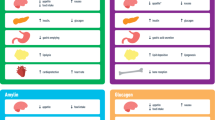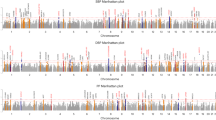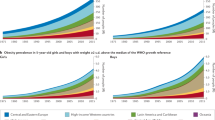Abstract
OBJECTIVE: To determine the role of polymorphisms in the genes for β3-adrenergic receptor (β3-AR) and in uncoupling proteins 1 and 2 (UCP-1, UCP-2) in obesity.
DESIGN: Association study with three polymorphisms and obesity.
SUBJECTS: Two hundred and thirty-six morbidly obese patients who underwent gastric banding surgery, 381 patients from the medical clinic and 198 healthy blood donors.
MEASUREMENTS: The frequencies of the W64R in β3-AR, the −3826A→G in UCP-1 and the 45 bp insertion in the 3′ untranslated region of exon 8 in UCP-2 polymorphisms were determined.
RESULTS: There were no significant differences in the frequencies of the β3-AR and UCP-1 polymorphisms between obese (body mass index, BMI>30 kg/m2) and lean subjects. Lean, but not obese, carriers of the R allele of β3-AR had a significantly higher BMI. The mean age of obese subjects (excluding diabetics) who were carriers of the G allele of the UCP-1 polymorphism, 36 y, was significantly younger than wild-type, 40 y (P=0.007). This effect was not seen in lean subjects. The effect of the G allele on the mean age of obese subjects was more apparent in subjects who were also carriers of the R allele of the β3-AR polymorphism. The frequency of the ins allele of UCP-2 was significantly higher in obese subjects, 0.31, than in lean, 0.24 (P=0.002) and carriers of the ins allele had a significantly higher BMI, 38 vs 35 (P=0.005). There was no association between any of the polymorphisms and type II diabetes.
CONCLUSION: In a German population, there was no association between the W64R in β3-AR or the −3826A→G in UCP-1 polymorphisms and obesity. However, they act synergistically to accelerate the development of obesity. The 45 bp insertion in the 3′ untranslated region of exon 8 in UCP-2 polymorphism is associated with obesity.
This is a preview of subscription content, access via your institution
Access options
Subscribe to this journal
Receive 12 print issues and online access
$259.00 per year
only $21.58 per issue
Buy this article
- Purchase on Springer Link
- Instant access to full article PDF
Prices may be subject to local taxes which are calculated during checkout


Similar content being viewed by others
References
Chagnon YC, Peruse L, Bouchard C . Familial aggregation of obesity, candidate genes and quantitative trait loci Curr Opin Lipidol 1997 8: 205–211.
Montague CT, Sadaf Farooqi I, Whitehead JP, Soos MA, Rau H, Wareham NJ, Sewter CP, Cigby JE, Mohammed SN, Hurst JA, Cheetham CH, Early AR, Barnett AH, Prins JB, O'Rahilly S . Congenital leptin deficiency is associated with severe early-onset obesity in humans Nature 1997 387: 903–908.
Ravussin E, Lillioja S, Knowler WC, Christin L, Freymond D, Abbott WG, Boyce V, Howard BV, Bogardus C . Reduced rate of energy expenditure as a risk factor for body weight gain New Engl J Med 1988 318: 467–472.
Bogadus C, Lillioja S, Ravussin E, Abbott W, Zawadzki JK, Young A, Knowler WC, Jacobowitz R, Moll PP . Familial depedence of the resting metabolic rate New Engl J Med 1986 315: 96–100.
Strosberg AD . Association of the β3-adrenoreceptor polymorphism with obesity and diabetes: current status TiPS 1997 18: 449–455.
Büettner R, Schäffler A, Arndt H, Rogler G, Nusser J, Zietz B, Enger I, Hügl S, Cuk A, Schölmerich J, Palitzsch K-D . The trp64arg polymorphism of β3-adrenergic receptor gene is not associated with obesity or type II diabetes malitus in a large population-based Caucasian cohort J Clin Endocrinol Metab 1998 83: 2892–2897.
Fujisawa T, Ikegami H, Kawaguchi Y, Ogihara T . Meta-analysis of the association of trp64arg polymorphism of β3-adrenergic receptor gene with body mass index J Clin Endocrinol Metab 1998 83: 2441–2444.
Walston J, Silver K, Bogardus C, Knowler WC, Celi FS, Austin S, Manning B, Strosberg AD, Stern MP, Raben N, Sorkin JD, Roth J, Shuldiner AR . Time of onset of non-insulin-dependent diabetes mellitus and genetic variation in the β3-adrenergic receptor gene New Engl J Med 1995 333: 343–347.
Widen E, Lehto M, Kanninen T, Walston J, Shuldiner AR, Groop LC . Association of a polymorphism in the β3-adrenergic receptor gene with features of the insulin resistence syndrome in Finns New Engl J Med 1995 333: 348–351.
Clement K, Vaisse C, Manning B, Basdevant A, Guy-Grand B, Ruiz J, Silver KD, Shuldiner AR, Froguel P, Strosberg AD . Genetic variation in the β3-adrenergic receptor and an increased capacity to gain weight in patients with morbid obesity New Engl J Med 1995 333: 352–354.
Flier JS, Lowell BB . Obesity research springs a proton leak Nat Genet 1997 15: 223–224.
Klaus S, Casteilla L, Bouillaud F, Ricquier D . The uncoupling protein UCP: a membraneous mitochondrial ion carrier exclusively expressed in brown adipose tissue Int J Biochem 1991 23: 791–801.
Fleury C, Neverova M, Collins S, Raimbault S, Champigny O, Levy-Meyrueis, C, Bouillaud F, Seldin MF, Surwit RS, Riquier D, Warden CH . Uncoupling protein-2: a novel gene linked to obesity and hyperinsulinemia Nat Genet 15: 269–272.
Vidal-Puig A, Solanes G, Grujic D, Flier JS, Lowell BB . UCP3: an uncoupling protein homologue expressed preferentially and abundantly in skeletal muscle and brown adipose tissue Biochem Biophys Res Commun 1997 235: 79–82.
Clement K, Ruiz J, Cassard-Doulcier AM, Bouilland F, Ricquier D, Basdevant A, Guy-Grand B, Froguel P . Additive effect−3826A→G variant of uncoupling protein gene and the trp64arg mutation of the β3-adrenergic receptor gene on weight gain in morbid obesity Int J Obes Relat Metab Disord 1996 20: 1062–1066.
Valve R, Heikkinen S, Rissanen A, Laakso M, Uusitupa M . Synergistic effect of polymorphisms in uncoupling protein 1 and β3-adrenergic receptor genes on basal metabolic rate in obese Finns Diabetologia 1998 41: 357–361.
Esterbauer H, Oberkofler H, Liu Y-M, Breban D, Hell E, Krempler F, Patsch W . Uncoupling protein-1 mRNA expression in obese human subjects: the role of sequence variations at the uncoupling protein-1 gene locus J Lipid Res 1998 39: 834–844.
Kogure A, Yoshida T, Sakane N, Umekawa T, Takakura Y, Kondo M . Synergistic effect of polymorphisms in uncoupling protein and β3-adrenergic receptor genes on weight loss in obese Japanese Diabetologia 1998 41: 1399.
Fumeron F, Durack-Brown I, Betoulle D, Cassard-Doulcier AM, Tuzet S, Bouillaud F, Melchoir JC, Ricquier D, Apfelbaum M . Polymorphisms of uncoupling protein (UCP) and β3-adrenergic receptor genes in obese people submitted to a low calorie diet Int J Obes Relat Metab Disord 1996 20: 1051–1054.
Bouchard C, Perusse L, Chagnon YC, Warden C, Ricquier D . Linkage between markers in the vicinity of the uncoupling protein-2 gene and resting metabolic rate in humans Hum Mol Genet 1997 6: 1887–1889.
Pratley RE, Thompson DB, Bogardus C . An autosomal gene scan for loci linked to prediabetic phenotypes in Pima Indians J Clin Invest 1998 101: 1757–1764.
Urhammer SA, Dalgaard LT, Sorensen TIA, Moller AM, Andersen T, Tybjaerg-Hansen A, Hansen T, Clausen JO, Vestergaard H, Pedersen O . Mutational analysis of the coding region of the uncoupling protein 2 gene in obese NIDDM patients: impact of a common amino acid polymorphism on juvenile and maturity onset forms of obesity and insulin resistance Diabetologia 1997 40: 1227–1230.
Walder K, Norman RA, Hanson RL, Schrauwen P, Neverova M, Jenkinson CP, Easlick J, Warden CH, Pecquer C, Raimbault S, Ricquier D, Harper M, Silver K, Schuldner AR, Solanes G, Lowell BR, Chung WK, Leibel RL, Pratley R, Ravussin E . Association between uncoupling protein polymorphisms (UCP2-UCP3) and energy metabolism/obesity in Pima Indians Hum Mol Genet 1998 7: 1431–1435.
Klannemark M, Orho M, Groop LC . No relationship between identified variants in the uncoupling protein 2 gene and energy expenditure Eur J Endocrinol 1998 139: 217–233.
Cassell PG, Neverova M, Janmohamed S, Uwakwe N, Qureshi A, McCarthya MI, Saker PJ, Albon L, Kopelman P, Noonan K, Easlick J, Ramachandran A, Snehalatha C, Pecquer C, Ricquier D, Warden CH, Hitman GA . An uncoupling protein 2 gene variant is associated with a raised body mass index but not type II diabetes Diabetologia 1999 42: 688–692.
Tu N, Chen H, Winnikes U, Reinert I, Marmann G, Pirke KM, Lentes K-U . Structural organization and mutational analysis of the human uncoupling protein-2 (hucp2) gene Pharmac Lett 1999 64: 41–50.
Otabe S, Clement K, Rich N, Warden C, Pecqueur C, Neverova M, Raimbault S, Guy-Grand B, Basdevant A, Ricquier D, Froguel P, Vasseur F . Mutation screening of the human UCP-2 gene in normoglycemic and NIDDM morbidly obese patients Diabetes 1998 47: 840–842.
Gagnon J, Mauriege P, Roy S, Sjöström D, Chagnon YC, Dionne FT, Oppert J-M, Perusse L, Sjöström L, Bouchard C . The trp64arg polymorphism of β3-adrenergic receptor gene has no effect on obesity phenotypes in the Quebec family study and Swedish obese subjects cohorts J Clin Invest 1996 98: 2086–2093.
Large V, Hellström L, Reynisdottir S, Lönnqvist F, Eriksson P, Lannfelt L, Arner P . Human beta-2 adrenoceptor gene polymorphisms are highly frequent in obesity and associate with altered adipocyte beta-2 adrenoceptor function J Clin Invest 1997 100: 3005–3013.
Oppert JM, Vohl MC, Chagnon M, Dionne FT, Cassard-Doulcier AM, Ricquier D, Perusse L, Bouchard C . DNA polymorphisms in the uncoupling protein (UCP) gene and human body fat Int J Obes Relat Metab Disord 1994 18: 526–531.
Acknowledgements
We thank Dr Wittkopf of the Blood Transfusion Centre, Universitätskrankenhaus Eppendorf, Hamburg for provision of the control blood samples. This work was supported by grants from the Deutsche Forschungsgemeinschaft to DE (Ev 29/2-1) and AM (Ma 1101/4-1) and KliFo 258/10/2.
Author information
Authors and Affiliations
Corresponding author
Rights and permissions
About this article
Cite this article
Evans, D., Minouchehr, S., Hagemann, G. et al. Frequency of and interaction between polymorphisms in the β3-adrenergic receptor and in uncoupling proteins 1 and 2 and obesity in Germans. Int J Obes 24, 1239–1245 (2000). https://doi.org/10.1038/sj.ijo.0801402
Received:
Revised:
Accepted:
Published:
Issue Date:
DOI: https://doi.org/10.1038/sj.ijo.0801402
Keywords
This article is cited by
-
The association of insertions/deletions (INDELs) and variable number tandem repeats (VNTRs) with obesity and its related traits and complications
Journal of Physiological Anthropology (2017)
-
A 45-bp insertion/deletion polymorphism of UCP2 gene is associated with metabolic syndrome
Journal of Diabetes & Metabolic Disorders (2014)
-
Association of the UCP polymorphisms with susceptibility to obesity: case–control study and meta-analysis
Molecular Biology Reports (2014)
-
Uncoupling protein 2 gene (UCP2) 45-bp I/D polymorphism is associated with adiposity among Malaysian women
Journal of Biosciences (2014)
-
Impact of UCP2 polymorphism on long-term exercise-mediated changes in adipocytokines and markers of metabolic syndrome
Aging Clinical and Experimental Research (2014)



